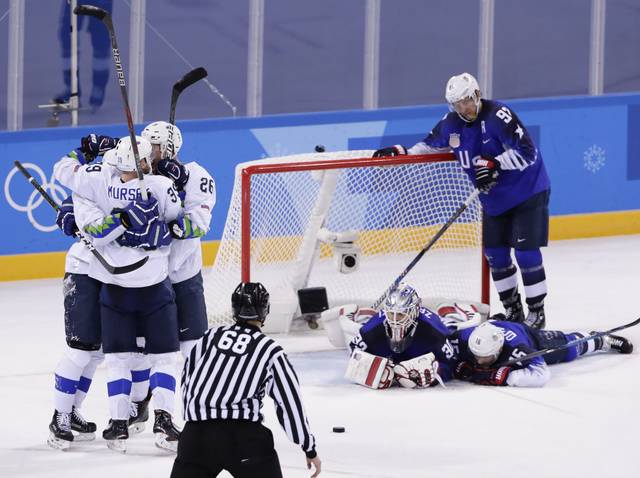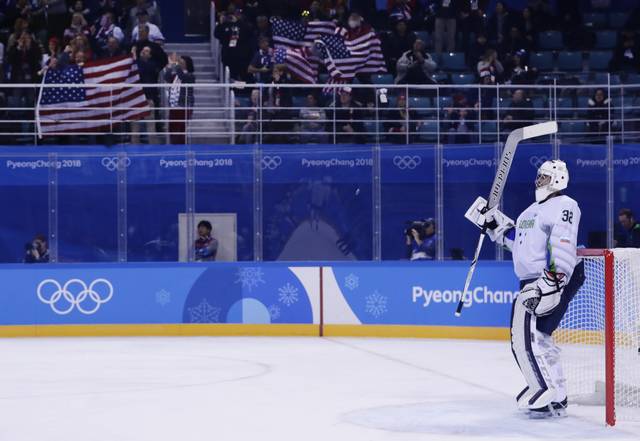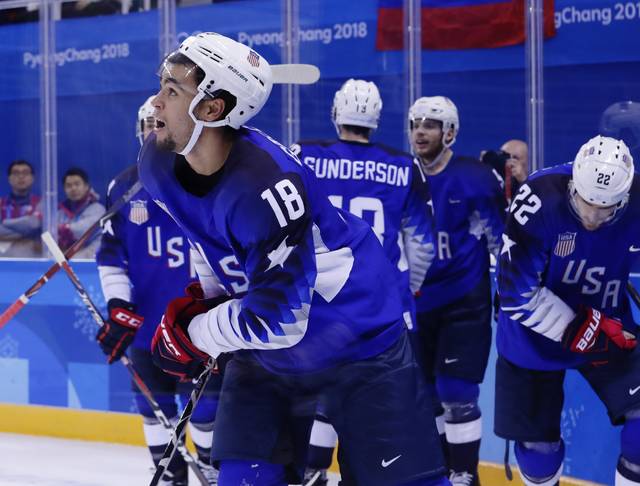


GANGNEUNE, South Korea (AP) — There’s no Cold War intrigue, no “Miracle on Ice” in the making, no chance of relishing the best players in the world.
Men’s hockey is in limbo at these Winter Olympics.
That’s not a good place to be.
The NHL is sitting out the games for the first time since 1994, a shortsighted decision that left the 12 teams to cobble their rosters together from a hodgepodge of European professionals, minor leaguers and college players .
The United States opened the tournament with a dismal 3-2 loss to tiny Slovenia in a minor league-sized arena on the campus of Catholic Kwandong University, not that anyone back home is likely to care about this no-name team blowing a two-goal lead in the third period before going down in overtime.
It could’ve passed for a midweek game in the American Hockey League.
Hershey vs. Rochester, anyone?
“We’re bummed that (NHL players) are not here,” said Mariah Vaglia, a Pittburgh native among the crowd of 3,348. “But we get to cheer the USA. We’re here in South Korea. We’re grateful for the experience.”
That attitude carried over to those on the ice. Hey, it’s not their fault the NHL isn’t here.
“Everyone wants to see the NHL’s best perform on a stage like this. I want to see the NHL’s best perform on a stage like this,” said Brian O’Neill, a 29-year-old forward who plays with Jokerit Helsinki in the Russian-based Kontinental Hockey League. “But we were given a really unique opportunity. All of us feel privileged and fortunate. We’re definitely going to try to take advantage of this opportunity.”
When the Soviets dominated Olympic hockey in the pre-NHL era, they revolutionized the game. The Big Red Machine was a ballet on ice, darting and weaving with stunning symmetry, always looking to make the extra pass. It was hockey at its best — yes, even better than what you’ll find in today’s NHL.
At Lake Placid in 1980, a team of American college kids somehow knocked off this mighty dynasty, a triumph of such monumental proportions that it lingers to this very day as the “Miracle on Ice,” an improbable tale passed down through the generations by people who wouldn’t know the difference between a puck and a pancake.
After the Soviet Union collapsed, the NHL stepped in to fill the void in 1998. Olympic hockey entered a new, more balanced era, with every nation having access to the world’s best players. Sure, Canada had more talent than anyone, but the Czech Republic and Sweden managed to win gold medals for the first time.
Some may have missed the charm of the amateur era, but the big-money professionals produced one of the most memorable Olympic finals at the 2010 Vancouver Games. Canada’s Sidney Crosby scored the gold medal-winning goal in overtime, setting off a national celebration in the birthplace of hockey after the United States tied the game in the waning seconds of regulation.
Crosby was back in Pittsburgh as the Olympic tournament began, just a few hours removed from doling out three assists to help the Penguins beat the Ottawa Senators 6-3.
He should be in Pyeongchang, trying to lead Canada to its third straight gold medal.
Unfortunately, when the NHL owners demanded a bigger piece of the financial pie, they ran up against a group that’s just as greedy as they are: the International Olympic Committee.
“It’s bad that the NHL guys are not here,” said Russian winger Ilya Kovalchuk, one of the few recognizable names in the tournament, before his team — supposedly the favorite — lost 3-2 to Slovakia. “All the best players should play here because it’s a big event. It’s a main event for, I think, any hockey player. But it is what it is.”
What is it, anyway? Really, nothing more than a mediocre gathering of has-beens, never-weres and maybe-somedays.
Less than a third of the 300 players have gotten any ice time in the NHL. The U.S. roster is composed mostly of players from five European leagues (all of which, unlike the NHL, shut down during the Olympics), augmented by four college players, three minor-leaguers and another guy currently between jobs.
Yawn.
“It is disappointing,” said German coach Marco Sturm, not even attempting to make a silk purse out of sow’s ear. “Knowing that all the players wanted to be here, this is unfortunate.”
Frankly, the NHL owners never seemed all that keen about taking another 2 1/2 week break so their players could go halfway around the world to compete in South Korea. In a country with little regard for hockey, it was hard to envision a whole lot of opportunities for expanding their commercial footprint.
The next Winter Games are an entirely different matter.
While China is hardly a hockey hotbed, the NHL would love to make inroads in the world’s most populous nation . Back in September, Los Angeles and Vancouver played a pair of preseason games in Shanghai and Beijing. The league will be back again next season, and it’s a pretty safe bet that the NHL will return to the Olympics in 2022.
That’s the way it should be.
No one wants to go through this again.
___
Paul Newberry is a sports columnist for The Associated Press. Write to him at pnewberryap.org or at www.twitter.com/pnewberry1963 . His work can be found at https://apnews.com/search/paul%20newberry
___
AP Hockey Writer Stephen Whyno contributed to this report.
___
For more AP Olympic coverage: https://www.wintergames.ap.org




